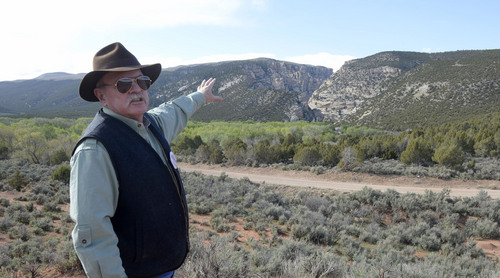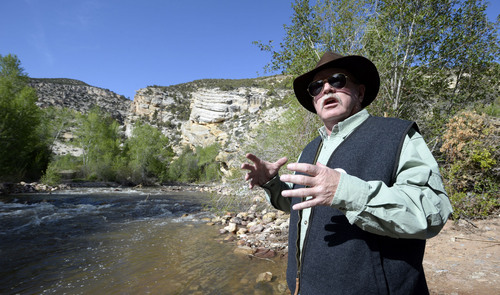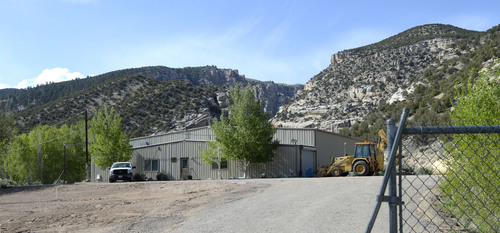This is an archived article that was published on sltrib.com in 2014, and information in the article may be outdated. It is provided only for personal research purposes and may not be reprinted.
Vernal • Fertilizer producers have long been interested in tapping phosphate deposits north of Vernal on the land around Taylor Mountain, particularly in the wake of price spikes five years ago that saw ore rich in phosphorous selling for more than $400 a ton.
Such development is typically welcomed in Uintah County, which has hitched its economic future to abundant natural resources, which include oil and gas, oil shale and gilsonite. But it's a different story when the minerals overlie the key source of culinary water; in this case, the aquifer that feeds Ashley Springs.
State officials say any development on school trust leases here would comply with Utah's environmental protection laws. But some Uintah County residents worry that phosphate mining cannot be done without posing unacceptable risks to an irreplaceable water source for two-thirds of the county, about 20,000 residents.
"I want to err on the side of common sense and drinking water, not on a mine that might not be profitable to start with. The environmental protection record of phosphate mining in the West is terrible," said Wayne Stevens, a retired Bureau of Land Management staffer running for the Utah Senate.
Phosphate ore is strip mined and its tailings often are laden with selenium and other trace metals that can leach into groundwater and harm agricultural lands.
But Stevens' main concern, which Uintah County and Vernal officials share, is the potential for mining operations to leak contamination into a fragile, irregular limestone — or karst — system that lies 1,000 to 2,000 feet below the ground. The system harbors an underground river that surfaces near Ashley Gorge and sustains eastern Utah's largest community.
They fear blasting and earth moving could crack the limestone formation holding the aquifer, allowing mine discharge to reach the water.
A Democrat facing incumbent Republican Kevin Van Tassell in November, Stevens is building his campaign around the proposed mine. With residents Loran Hills and Brenda Durant, Stevens founded the Uintah County Water Source Protection Coalition to fight it. They insist the leases be retired and the land withdrawn from mineral entry, removing any threat of future development.
Phosphate represents a small slice of Utah's $1.2 billion industrial minerals industry, currently dominated by potash. The Simplot Phosphates mine, 12 miles north of Vernal, is the only producer, yielding 1.3 million tons of concentrated ore that are transported by underground pipeline 96 miles to Simplot's fertilizer plant in Rock Springs, Wyo.
State officials say any mining near Ashley Springs is a long way off and no formal proposal is even on the table yet.
The Utah School and Institutional Trust Lands Administration, or SITLA, acquired two blocks of land in the 1960s from the federal government, one on either side of Ashley Gorge, with the goal of developing their minerals, according to the agency's director, Kevin Carter. These leases would have been mined by now but for one would-be developer's failure to secure an avenue for delivering concentrated ore to processing facilities, Carter said.
Canada's Calgary-based Agrium Inc. took over the leases in 2008 and its subsidiary, Utah Phosphate Co., recently drilled 39 test holes on the 3,400-acre SITLA block on the east side of the gorge. Cores show a 20-foot seam contains marketable ore, Carter said.
The best way to move mined ore would be to crush it, mix it with water and ship it by pipeline in slurry form. Another possibility would be to truck it to rail corridors in Wyoming.
Carter says state regulators would not approve any projects that would endanger such a critical source of water.
"We expect to be regulated and, if development occurs, that it will be done in a responsible manner that won't degrade the environment," Carter said.
The Uintah County Commission, however, wants Agrium to prove no harm will come to the aquifer before any mining is authorized. This is because once damage occurs, there will be no way to fix it, according to Commissioner Mike McKee.
"You can't mess with the water for our valley," McKee said. "We are ensuring the water to our community remains uncompromised."
In response to Agrium's exploratory drilling last year, the commission established the Ashley Spring Protection Zone, which extends 2 miles on either side of the aquifer for 15 miles, from Taylor Mountain Road west along Dry Canyon to Mosby Mountain.
The county will tolerate no drilling, mining and other ground disturbance within these boundaries unless the developer proves it won't "clog, alter, impair, or diminish water flow through the Ashley Springs system."
The U.S. and Utah geological surveys are studying Ashley Springs to better understand its karst systems and their vulnerability to mining operations.
McKee hopes to resolve the controversy by arranging a land swap in which SITLA would give up its Ashley Springs holdings in exchange for federal mineral-rich land elsewhere.







